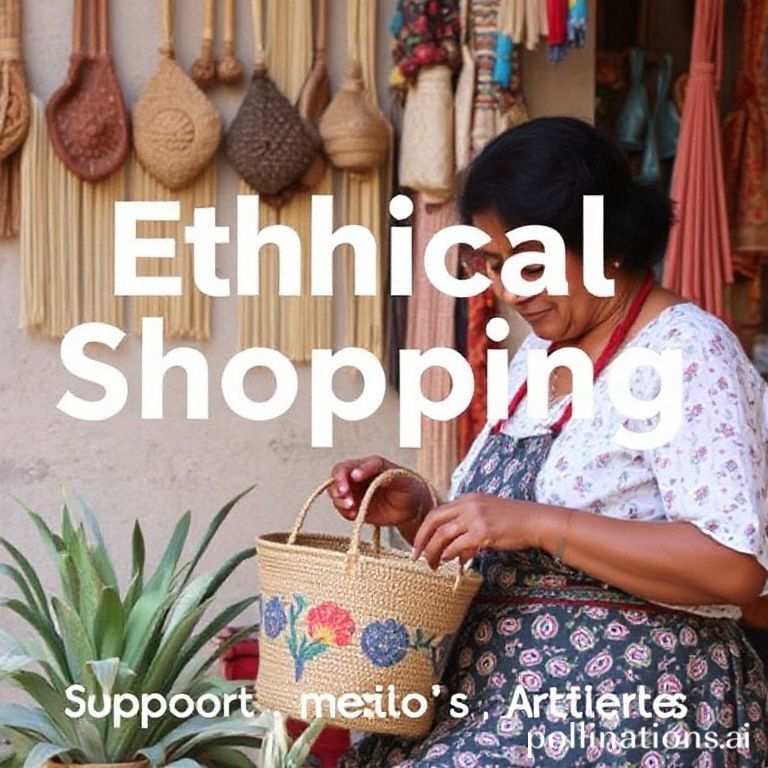Mexico is a land of vibrant culture and rich artistic traditions. From colorful textiles to intricate pottery and stunning silver jewelry, the country boasts a wealth of handcrafted goods. But beyond the beauty of these items lies the crucial need to support the talented artisans who create them. Ethical shopping in Mexico is more than just buying souvenirs; it’s about empowering communities, preserving cultural heritage, and ensuring fair compensation for skilled craftspeople.
When we choose to buy directly from artisans or from shops that prioritize fair trade practices, we contribute to a more sustainable and equitable economy. We help artisans maintain their livelihoods, pass on their skills to future generations, and preserve the unique cultural identity of their communities. This article will guide you through the importance of ethical shopping in Mexico and provide tips on how to find authentic, ethically sourced goods.
Why Ethical Shopping Matters in Mexico
The allure of mass-produced souvenirs can be tempting, especially when prices are low. However, these items often come at a hidden cost. They may be made in factories that exploit workers, use unsustainable materials, and contribute to environmental degradation. By contrast, ethically sourced artisan goods offer a positive alternative, fostering economic empowerment and cultural preservation.
Preserving Cultural Heritage
Many traditional crafts in Mexico are passed down through generations, carrying with them centuries of history and cultural significance. By supporting artisans, we help ensure that these skills and traditions are not lost. Each purchase becomes an investment in the preservation of Mexico’s rich cultural heritage.
Empowering Communities
Ethical shopping provides artisans with a fair income, allowing them to support their families and improve their living conditions. It empowers them to invest in their communities and build a better future for themselves and their children. This economic independence strengthens communities and reduces reliance on exploitative labor practices.
Promoting Sustainable Practices
Many artisans use traditional techniques and natural materials that are environmentally friendly. They often prioritize sustainability in their production processes, minimizing waste and reducing their impact on the environment. By supporting these practices, we contribute to a more sustainable and responsible economy.
Tips for Ethical Shopping in Mexico
Finding ethically sourced goods in Mexico requires a bit of research and awareness. Here are some tips to help you shop responsibly and support local artisans:
- Buy Directly from Artisans: Visit local markets and workshops to purchase goods directly from the people who make them. This ensures that the artisans receive the full profit from their work.
- Look for Fair Trade Certifications: Seek out products that are certified by fair trade organizations. These certifications guarantee that the artisans have been paid fairly and that the goods have been produced in an ethical and sustainable manner.
- Ask Questions: Don’t be afraid to ask vendors about the origin of their products, how they were made, and how the artisans are compensated. This shows that you care about ethical practices and encourages transparency.
- Shop at Cooperatives and Non-Profits: Support organizations that work directly with artisan communities, providing them with training, resources, and access to markets. These organizations often offer high-quality, ethically sourced goods.
- Be Wary of Bargains: Extremely low prices can be a red flag, suggesting that the artisans may not be receiving fair compensation. Be willing to pay a fair price for handcrafted goods, recognizing the value of the skill and labor involved.
- Learn About the Craft: Take the time to learn about the different crafts and techniques used in Mexico. This will help you appreciate the skill and artistry involved and make more informed purchasing decisions.
Where to Find Ethical Souvenirs
Fortunately, Mexico offers numerous opportunities for ethical shopping. Many cities and towns have artisan markets and cooperatives that sell directly to the public. Here are a few examples:
- Oaxaca: Known for its vibrant textiles, black pottery, and wood carvings. Visit the local markets and artisan villages to find authentic, handcrafted goods.
- San Cristobal de las Casas, Chiapas: A hub for indigenous crafts, including textiles, jewelry, and leather goods. Shop at the cooperatives and artisan markets to support local communities.
- Tlaquepaque, Jalisco: Famous for its ceramics, glassware, and furniture. Explore the numerous artisan workshops and galleries to find unique, handcrafted treasures.
- San Miguel de Allende, Guanajuato: Offers a wide variety of crafts, including silver jewelry, textiles, and folk art. Visit the local markets and artisan shops to support local artisans.
Conclusion
Ethical shopping in Mexico is a meaningful way to connect with the country’s rich culture and support its talented artisans. By making conscious choices about where we spend our money, we can contribute to a more sustainable and equitable economy, preserve cultural heritage, and empower communities. The next time you’re shopping for souvenirs in Mexico, remember that your purchase has the power to make a positive impact.
If you enjoyed this article, don’t forget to explore more inspiring stories on Life in Mexico!
IMAGE: A brightly lit, open-air artisan market in Oaxaca, Mexico. Focus on a woman weaver with weathered hands working at her loom, creating a vibrant, colorful textile. In the background, other artisans display their crafts, including pottery, wood carvings, and jewelry. The mood is warm, inviting, and authentic, showcasing the beauty and skill of Mexican craftsmanship. The style is realistic and documentary-like.


